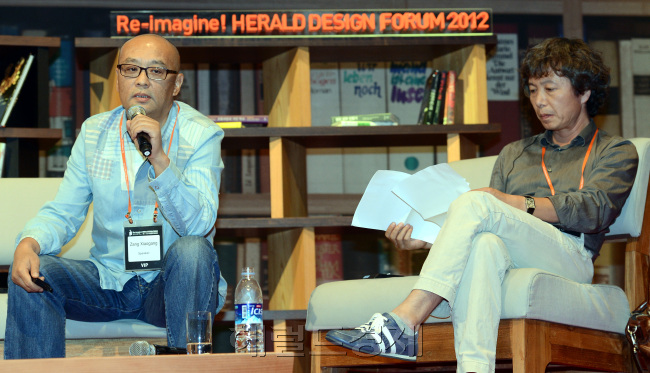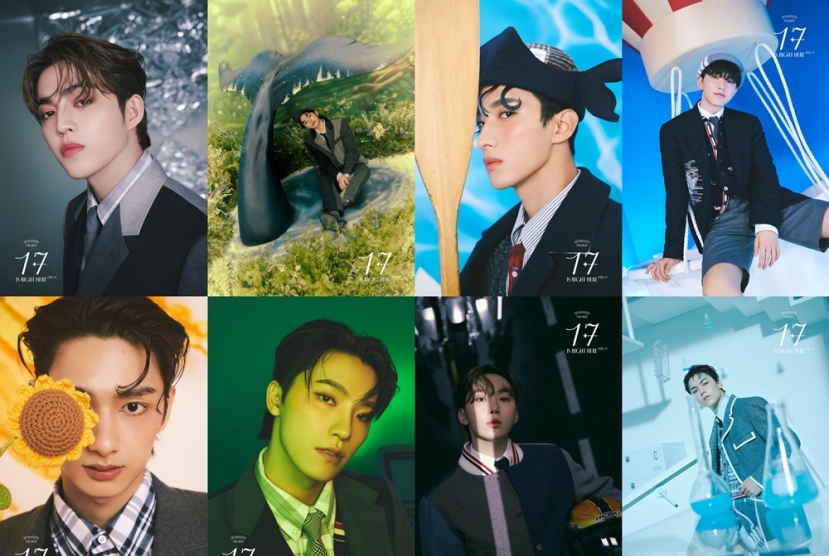Zhang Xiaogang, one of the best-selling artists in contemporary Chinese art, said he is not swayed by his tremendous success and still follows his heart,
“Art is not about business but life. If art were business, I would have studied and followed the example of successful people ― but that just isn’t my way of doing art,” Zhang said in a lecture at the Herald Design Forum 2012 in COEX Auditorium, Seoul, on Thursday.
“Whether I can succeed or not, I follow my heart. What really counts in art is how you express life.”
His long-time friend Yun Chea-gab, an independent Korean curator, said the artist still leads a humble life despite his huge success.
“Art is not about business but life. If art were business, I would have studied and followed the example of successful people ― but that just isn’t my way of doing art,” Zhang said in a lecture at the Herald Design Forum 2012 in COEX Auditorium, Seoul, on Thursday.
“Whether I can succeed or not, I follow my heart. What really counts in art is how you express life.”
His long-time friend Yun Chea-gab, an independent Korean curator, said the artist still leads a humble life despite his huge success.

“Successful artists like to indulge themselves in luxury, but Xiaogang sticks to his humble lifestyle.”
Zhang talked about his artistic world and how it has changed over time, through major historical upheavals in China.
Born in Kunming, China, in 1958, the Chinese artist grew up in Sichuan, where he attended Sichuan Fine Arts Institute. Zhang said that the year 1983 marked the beginning of a very important stage in his art life. He had no opportunities to hold an exhibition then, but he remained fascinated with the West’s contemporary art movement, as well as philosophers such as Fredrich W. Nietzsche, Sigmund Freud and leaders of the avant-garde movement.
Although Zhang’s graduation project “Prairie” portraying the life of Jiangzu, or Tibetans, won critical acclaim, it was rejected several times for failing to comply with the national art trend.
In those days, Chinese contemporary paintings were largely about the lives of Chinese people as a nation rather than an individual’s inner state of mind. “I was armed with mental seclusion. I plunged myself into a sort of comfortable isolation,” he said.
Zhang adhered steadfastly to his conviction of self-identification and self-questioning. He entered a second stage of life as he was taken by intense desire for spiritual improvement.
“That was when I was immensely interested in life itself,” he said. “That’s when I found how life, death and love would continuously interact and yield agony and other humane things.”
“For artists, even pain is such a beautiful thing.”
By Chung Joo-won (joowonc@heraldcorp.com)








![[Graphic News] More Koreans say they plan long-distance trips this year](http://res.heraldm.com/phpwas/restmb_idxmake.php?idx=644&simg=/content/image/2024/04/17/20240417050828_0.gif&u=)
![[KH Explains] Hyundai's full hybrid edge to pay off amid slow transition to pure EVs](http://res.heraldm.com/phpwas/restmb_idxmake.php?idx=644&simg=/content/image/2024/04/18/20240418050645_0.jpg&u=20240419100350)






![[KH Explains] Hyundai's full hybrid edge to pay off amid slow transition to pure EVs](http://res.heraldm.com/phpwas/restmb_idxmake.php?idx=652&simg=/content/image/2024/04/18/20240418050645_0.jpg&u=20240419100350)

